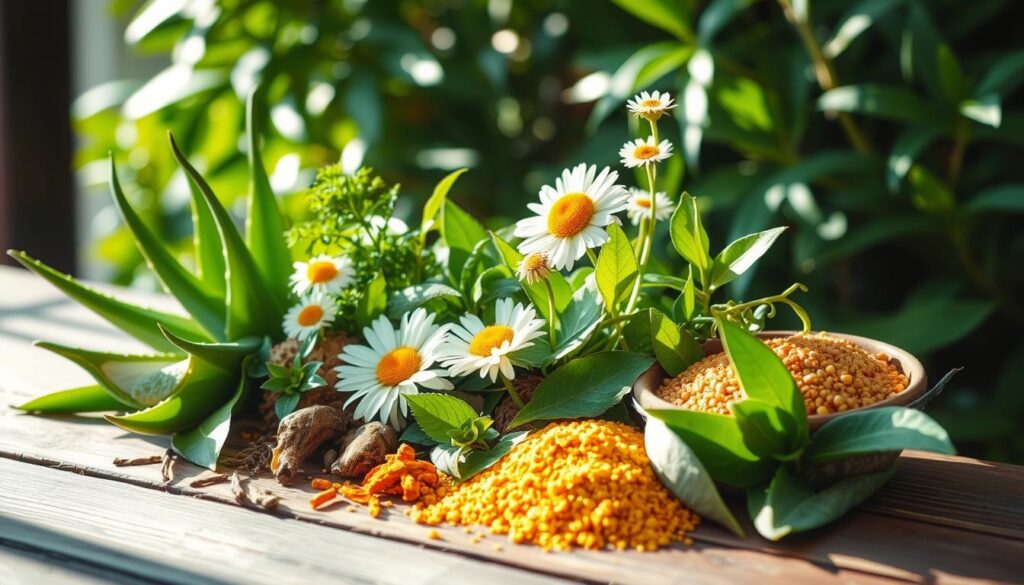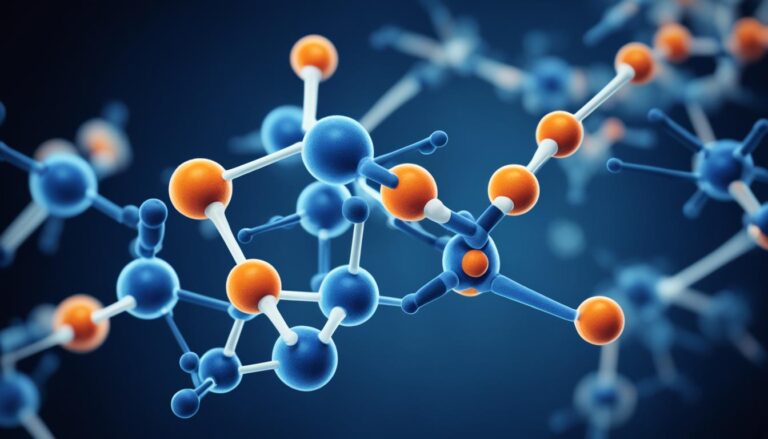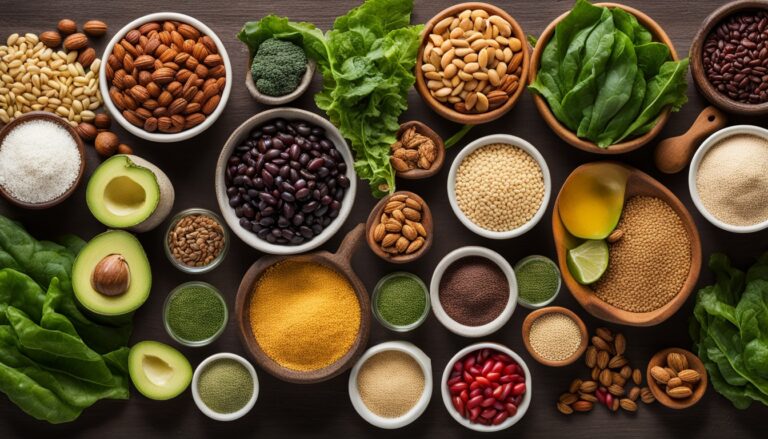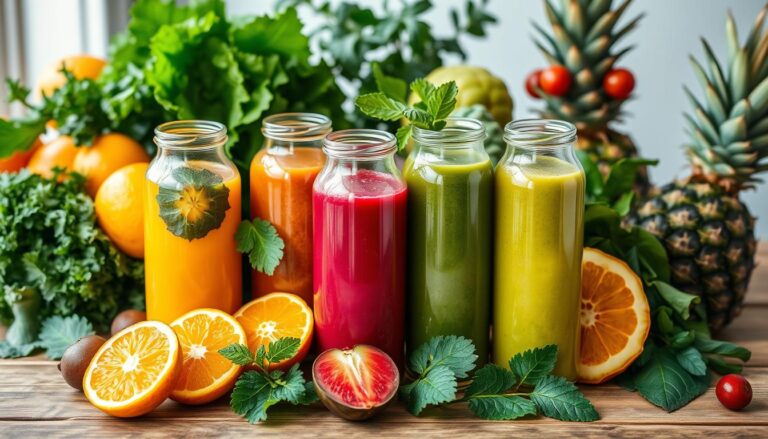Are you curious about boosting your melanin levels naturally? Melanin is a pigment that colors our skin hair and eyes.
It also protects our skin from UV rays and lowers skin cancer risk. While our genes set our melanin baseline research finds ways to increase it through diet and lifestyle.
This article will explore melanin and how to boost it naturally. We’ll look at foods antioxidants, herbal remedies, and supplements. You’ll learn how to enhance your skin’s melanin and health. Get ready for a journey to a brighter, healthier complexion.
Key Takeaways
- Melanin is a natural pigment that protects the skin from UV rays and lowers skin cancer risk.
- While genetics mainly set our melanin levels, research finds ways to increase it through diet and lifestyle.
- Nutrients like antioxidants, vitamins A, E, and C may boost melanin and improve skin health.
- Herbs and botanicals may protect the skin from UV damage, supporting melanin production.
- Safe and effective ways to increase melanin are still being researched. It’s important to avoid unproven or unsafe methods.
What is Melanin?
Melanin is a natural pigment made by cells called melanocytes. It gives skin, hair, and eyes their colors. Melanin protects the skin from UV rays and fights off harmful free radicals.
Melanin’s Functions and Importance
Melanin is key in defending against UV damage. It absorbs UV light keeping it from harming skin cells. This helps prevent skin cancer and other sun-related problems.
Melanin also acts as an antioxidant. It finds and neutralizes harmful free radicals. This keeps skin, hair, and eyes healthy and young-looking.
| Melanin Types | Functions |
|---|---|
| Eumelanin | Responsible for brown and black pigmentation in hair skin, and eyes. |
| Pheomelanin | Produces pinkish-red hues in the skin hair, and eyes. |
| Neuromelanin | Found in the brain, where it plays a role in the function and protection of certain neurons. |
Genetics ancestry and sun exposure affect melanin levels. This leads to the wide range of skin hair, and eye colors. Issues like albinism and vitiligo happen when melanin production is off.
Can You Increase Melanin Naturally?
While your genetics mainly decide your melanin levels research hints at ways to increase melanin production through diet and lifestyle. Yet it’s crucial to remember that no safe proven methods exist to reliably boost melanin levels. The best strategy is to keep your skin healthy and shield it from UV damage.
Melanin is key in protecting the skin from UV radiation. It absorbs and scatters harmful UV rays reducing the risk of skin cancer sunburn, and early aging. Its antioxidant properties also fight off free radicals, protecting skin cells and boosting overall skin health.
One natural way to increase melanin naturally is by getting sun, as UV radiation stimulates melanin in the skin. Eating foods rich in antioxidants like berries, citrus fruits leafy greens, and nuts can also boost melanin. Plus vitamins C, E, and B12, along with copper-rich foods, support melanin synthesis and skin health.
Though there’s no surefire way to greatly boost melanin production, a balanced diet, sun protection, and a healthy lifestyle can help keep your skin’s melanin levels up. This promotes overall skin vitality.

Melanin is a remarkable substance that plays a crucial role in protecting our skin from the damaging effects of UV radiation. While we can’t control our genetics there are steps we can take to support our skin’s natural melanin production and maintain its health.
Nutrients That May Boost Melanin
More research is needed to fully understand how certain nutrients boost melanin. Melanin is the pigment that gives skin and hair its color. Adding these nutrients to your diet might help protect your skin from sun damage and make it look healthier and more vibrant.
Antioxidants
Antioxidants like flavonoids and polyphenols are found in fruits, vegetables, and dark chocolate. They may help reduce UV damage and possibly increase melanin production. Blueberries leafy greens, pecans beans, and artichokes are all good sources of these nutrients.
Vitamin A
Vitamin A is key for healthy skin and might help with melanin production, though more research is needed. You can find vitamin A in sweet potatoes carrots, and leafy greens.
Vitamin E
Vitamin E is a strong antioxidant that can protect the skin from sun damage. However, its direct effect on melanin production is still unclear. You can get vitamin E from olive oil, spinach, almonds, and avocados.
Vitamin C
Vitamin C is vital for skin health and might influence melanin production. Foods rich in vitamin C, like citrus fruits, bell peppers, and leafy greens, can help keep your skin looking healthy.
Eating foods rich in these nutrients can help support your skin’s melanin production. This can make your skin more resilient against environmental stressors.
Herbs and Botanicals for Skin Protection
Herbs and botanical extracts are great for skin protection. Studies show they can help shield skin from UV rays. Ingredients like green tea and turmeric have antioxidants that fight sun damage.
Even though they don’t increase melanin they’re good for skin health. Antioxidants in these plants fight oxidative stress. This can prevent early aging and other skin issues.
| Herb/Botanical | Potential Benefits |
|---|---|
| Green Tea | Rich in polyphenols, which possess potent antioxidant properties to shield the skin from UV-induced damage. |
| Turmeric | Contains curcumin, a compound with anti-inflammatory and antioxidant effects that may help protect the skin. |
| Licorice Root | Exhibits tyrosinase-inhibiting properties, which can help reduce the appearance of dark spots and even skin tone. |
| Aloe Vera | Known for its soothing and hydrating properties, aloe vera can also help neutralize free radicals and reduce inflammation. |
Even though they don’t boost melanin adding them to your skincare can protect your skin. Always talk to a healthcare professional before trying new products especially if your skin is sensitive.

Read more: Your Skincare Routine with 17+ Tips
How can I increase my melanin?
There’s no safe way to really boost melanin levels. The best thing is to keep your skin healthy. Eat well protect your skin from the sun, and use some nutrients and antioxidants. Stay away from products that claim to boost melanin as they might be harmful. Always talk to a doctor if you’re worried about your skin color.
Eumelanin is the main melanin and comes in black and brown types. People with dark hair have more black eumelanin. Blonde hair has mostly brown eumelanin. Pheomelanin is in pink parts of the body, like lips. Those with red hair have equal amounts of both.
Being in the sun can help make more melanin, which protects your skin. Vitamins A, C, and E, and vitamin D can also help. But always check with a doctor before taking any supplements. The science on these is still growing.
| Nutrient | Impact on Melanin Production |
|---|---|
| Vitamin A | Helps produce more melanin |
| Vitamin E | Can enhance skin pigmentation with sun exposure |
| Vitamin C | Significantly increases melanin production and acts as an antioxidant |
| Vitamin B12 and Folic Acid | Protect DNA, cells, and nerves |
| Beta-carotene and Lycopene | Antioxidants that increase melanin production |
In short, boosting melanin isn’t guaranteed. But eating right protecting your skin, and using some vitamins and antioxidants can help. This supports your skin’s natural melanin and keeps it healthy.
Foods Rich in Antioxidants
Eating foods high in antioxidants is key for healthy skin. These foods help your body make melanin, which is important for skin health. They give your skin the nutrients it needs to stay healthy.
Examples of Antioxidant-Rich Foods
- Leafy greens kale spinach collard greens
- Nuts almonds walnuts pecans
- Whole grains
- Dark chocolate at least 70% cocoa
- Beans red pinto black
- Berries raspberries blueberries blackberries
Berries like blueberries, strawberries, and blackberries are full of antioxidants and vitamin C. They help make collagen and melanin. Dark leafy greens like spinach and kale, are packed with vitamins and minerals. They boost melanin production and keep skin healthy.
Nuts and seeds, like almonds and walnuts, have omega-3 fatty acids. These fats are good for skin health and melanin production. Citrus fruits such as oranges and lemons, are rich in vitamin C. Vitamin C helps make collagen and melanin.
Adding these foods to your diet gives your body the nutrients it needs. This helps keep your skin healthy and supports melanin production. Melanin is vital for skin health and looks.
Eat a diet rich in antioxidant-rich foods to nourish your skin and potentially boost melanin production.
Vitamins for Melanin Production
Many essential vitamins can help with melanin production, the pigment that gives skin its color. Eating foods rich in these vitamins can help keep your skin healthy and melanin-rich. More research is needed but it’s a good start.
Vitamin A Sources
Vitamin A is found in fish, leafy greens, and orange/yellow veggies. It’s a fat soluble antioxidant that protects the skin from UV damage. Eating foods high in vitamin A can help with melanin balance.
Vitamin E and Its Benefits
Vitamin E is in vegetable oils, nuts seeds, and green leafy veggies. It protects the skin from sun damage and may treat vitiligo, a condition that causes skin color loss.
Vitamin C for Skin Health
Vitamin C is in fruits and veggies like peppers, kiwi, and broccoli. It helps reduce pigmentation and supports the skin’s defense against environmental stressors. This can affect melanin production.
Eating foods rich in vitamins A, E, and C can help your skin stay healthy and melanin-rich. It’s a good step towards better skin health.
Consuming a diet rich in antioxidants like vitamins A, E, and C may help support the skin’s natural melanin production and protect against UV-induced pigmentation.
Other Potential Melanin Boosters
Research shows that vitamins B12 and folic acid might help with melanin production and skin health. While the evidence isn’t as strong as for vitamins A, C, and E, it’s worth looking into these nutrients as possible melanin boosters.
Vitamin B12 and Folic Acid
Vitamin B12 deficiency is linked to skin conditions like vitiligo, where skin loses pigmentation. Some studies suggest that taking vitamin B12 might slow down vitiligo and help with melanin. Folic acid is also being studied as a melanin booster, but more research is needed.
It’s key to remember that these nutrients might affect melanin levels, but their impact isn’t as clear as vitamins A, C, and E. Eating a balanced diet and addressing any nutrient deficiencies is a smart way to support skin health and possibly boost melanin.
| Nutrient | Potential Benefits for Melanin | Food Sources |
|---|---|---|
| Vitamin B12 | May help slow the progression of vitiligo and potentially aid in melanin production | Meat, fish, poultry, eggs, dairy products, fortified cereals |
| Folic Acid | May have a positive impact on melanin production, but more research is needed | Leafy green vegetables, beans, citrus fruits, whole grains, fortified foods |

Even though research on vitamin B12 and folic acid’s effect on melanin isn’t as deep, they might still support skin health and pigmentation. Eating a balanced diet and fixing any nutrient gaps can help your skin and possibly increase melanin levels.
Safe Tanning Methods
Sun exposure can increase melanin but also risks skin damage and cancer. Instead, try sunless tanners and bronzers. They darken your skin safely without UV rays. Always use sunscreen with SPF 30 or higher to protect your skin.
A study showed 85% of people loved MartiDerm’s Bronze D Body Spray SPF30. It made their skin radiant and prolonged their tan. Foods like blueberries and carrots also help achieve a tan. They protect skin cells with antioxidants.
Oily fish and nuts are good for skin elasticity and lasting tans. A study found that sunless tanning is linked to safe tanning beliefs. Young frequent tanners often don’t know the dangers of unsafe tanning.
| Safe Tanning Methods | Potential Benefits |
|---|---|
| Sunless Tanners and Bronzers | Provide a temporary, cosmetic darkening of the skin without exposure to harmful UV rays. |
| Antioxidant-Rich Foods | Help in achieving a natural, healthy-looking tan while protecting skin cells from damage. |
| Fatty Acids from Oily Fish and Nuts | Promote skin elasticity and help maintain a longer-lasting tan. |
Safe tanning methods can give you a radiant glow. But, always protect your skin with broad-spectrum sunscreen. Use one with SPF 30 or higher, no matter your skin tone.
Protecting Your Skin
It doesn’t matter how much melanin you have. Protecting your skin from the sun’s UV rays is key. Always use a broad spectrum sunscreen with SPF 30 or higher. Reapply it often when you’re outside.
Wear clothes that cover your skin, stay in the shade, and avoid tanning beds. They can raise your risk of skin cancer.
Studies show that 85% of volunteers loved the Bronze [D] Body Spray SPF30 from MartiDerm’s Sun Care range. They said it made their skin glow. Also, 88% of volunteers said it helped their tan last longer.
Keeping your skin healthy and protected from the sun is vital. Eating foods rich in antioxidants, like blueberries and avocados can help your tan. Foods with beta-carotene like carrots and tomatoes, protect your skin cells.
Oily fish and nuts keep your skin elastic and your tan going. People with darker skin have a lower risk of skin cancer. But remember everyone needs to protect their skin from the sun.

To fight skin cancer use sunscreen and don’t stay in the sun too long. There’s no safe way to make your skin darker. Stick to protecting your skin and taking care of it.
Conclusion
Your genetics mainly decide how much melanin you have. But, research shows some ways to help your body make more melanin. Eating well and protecting your skin from the sun are the best ways to do this.
It’s true that there’s no surefire way to boost melanin levels a lot. But, taking care of your skin and protecting it from the sun is very important. This helps your skin stay healthy, no matter your natural melanin.
Being healthy and balanced is key to supporting your skin’s natural defenses. This can help increase your melanin levels a bit. Remember, your skin’s beauty and uniqueness come from within. True confidence and glow come from embracing who you are.





